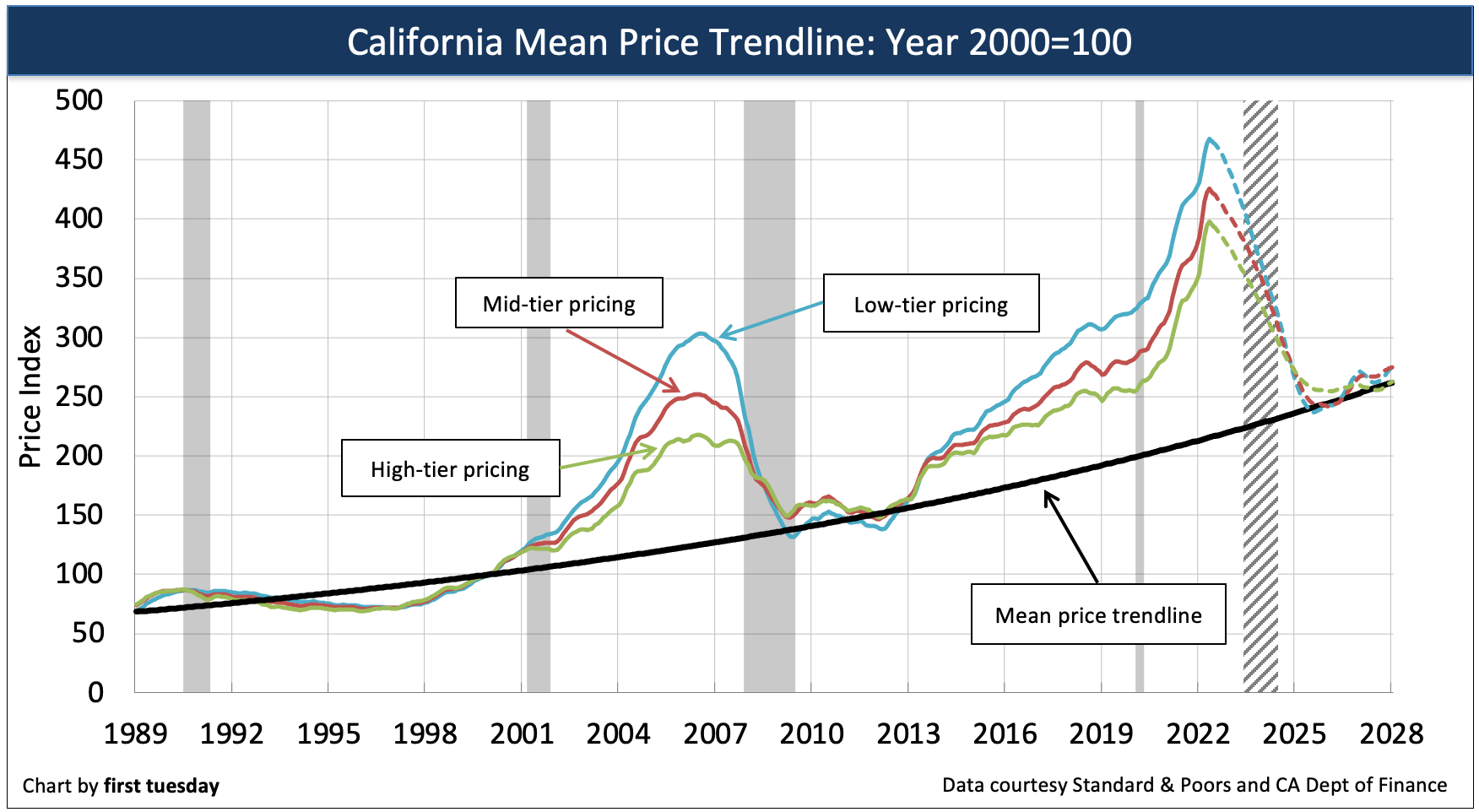How will the 2022-2023 recession affect the inventory of properties for sale in California?
- Inventories will increase. (71%, 70 Votes)
- Inventories will decrease. (21%, 21 Votes)
- The recession will have little impact on inventory levels. (8%, 8 Votes)
Total Voters: 99
This article examines the Pandemic Economy of 2020-2021, and what will happen to California’s real estate market now that it is over.
Home prices, untethered
We admit it, the past two years have been pretty exciting for real estate.
From the end of 2019 through their peak in June 2022, California home prices spiked a jaw-dropping 50%. In other words, a home worth $500,000 before the pandemic was worth $750,000 in mid-2022. Within many metros, the increase was even steeper (did someone mention inflation?).
Providing the fuel for this rapid price jump was a combination of:
- record-low mortgage interest rates, artificially induced by the Federal Reserve (the Fed) to maintain borrowing during the 2020 recession and pandemic;
- unprecedented injections of stimulus payments into individual wallets; and
- homebuyer fear of missing out (FOMO), which escalated enthusiasm for moving during the pandemic response.
As we head into the twilight months of 2022, all hangover from these factors has completely dissipated, and the excitement of the Pandemic Economy is quickly turning to dread.
With interest rates at their highest level in years, home sales volume in decline and buyer enthusiasm in the basement, it’s almost like these pricing boosts were never there at all.
In the months ahead, expect prices to decline 40% from their peak, to dip below 2019 levels, where they will meet the mean price trendline around 2025.

The mean price trendline is the historical equilibrium to which home prices return each cycle (the black line in the chart above). The trendline’s anchor is homebuyer incomes, which tend to rise at an annual rate of 2%-3%. Since homebuyers cannot pay more than they save and earn, all deviations from the trendline are temporary.
While you can make your own forecast for home prices, the undeniable direction for the real estate market in the months ahead is down.
How to interpret today’s housing numbers
Media reports typically cite month-over-month or year-over-year figures to describe how housing factors are changing.
For example, in July 2022, California home sales volume was 20% below the prior month and 18% below a year earlier. However, sales volume in 2021 was inflated by record-low interest rates, when buyer purchasing power was even higher than homebuyer competition for a limited inventory of homes. Thus, the annual comparison is a bit unfair, since 2021 was an anomaly.
A better comparison to make is to the last “normal” year for real estate: 2019.
In this last year before the Pandemic Economy took over, California’s housing market experienced:
- flat-to-down home sales volume, a continuation of the past decade of plateaued sales numbers;
- an annual price increase of 3.6%, matching pace with buyer incomes; and
- average 30-year fixed rate mortgage (FRM) rates around 4.0%.
The pandemic interrupted a long-term rise in mortgage rates which began in 2013. FRM rates dropped, launching home price increases. Buyers, spurred on by pandemic issues like remote work and social distancing, were further encouraged to make a move during these two years.
Thus, after two years of irregular housing market performance, expect sales volume in 2022 to end the year slightly below 2019, overwhelmed by rising interest rates, a still-recovering jobs market — and more cautious homebuyers.
The housing market is in retreat: now what?
For readers new to real estate in the last decade, this will be the first real estate recession you need to weather.
What’s your best strategy to continue making a living in the lean years to come?
Brokers and agents need to plan their survival strategy as soon as possible, because the old ways of practicing simply won’t cut it.
The first thing agents can change is their attitude toward buyers and sellers. In recent years, sellers have been in the driver’s seat, with listings a hot commodity for sales agents.
But as listings continue to sit for longer on the market and prices continue to drop, listings will no longer represent guaranteed income for agents. As buyers gradually wrest control of the housing market from sellers, agents will need to adapt.
This includes expanding marketing efforts to focus on buyers and renters.
Related article:
Agents who continue to take on listings during the recession will need to become familiar with nontraditional listings, like real estate owned (REO) property, foreclosures and short sales.
Agents can also get ahead by catering to investors, who are some of the most active buyers in a recession. Become versed in forming real estate syndicates and acting as property manager for investment properties acquired by syndicates.
Agents can also pivot into adjacent forms of practice, such as:
- obtaining a brokers license;
- becoming a property manager;
- obtaining a mortgage loan originator (MLO) endorsement; and
- becoming a notary public.
Even though the real estate recession is already causing waves, it’s not too late to plan your recession strategy and make it through. But every day you delay is a step toward joining the 94,000 agents whose careers died during the 2008 recession.
Related article:














We’re in uncharted territory, an inflation created by after-pandemic demand, supply lines not fully restored, worldwide events, greedy middleman and an extremely gullible Fed that unnecessarily made ultralow interest rates possible.
Fed’s responsibility to create inflation isn’t ending right here, it also wants to ‘own’ the next recession, and possibly the next ‘stagflation’. All this after being publicly chastised by previous administration leader to bring rock bottom interes rates.
Just as you can’t fix stupid, it can’t fix this situation with old tools (by raising rates).